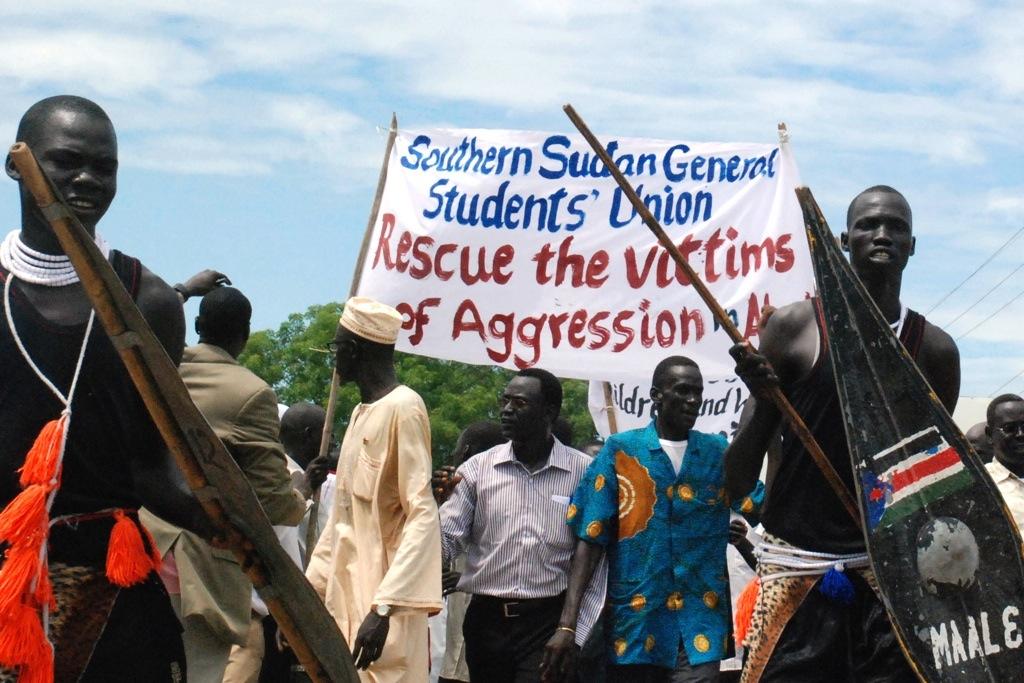Satellite images show Sudan army take control of another town
Some 200 Sudanese demonstrators in the capital of southern Sudan, Juba, demonstrate against the northern military occupation of the contested Abyei region on May 23, 2011. The U.N. demanded that Khartoum withdraw its troops from Abyei after what the south branded an ‘invasion’ of the flashpoint border district prompted warnings Sudan is “close to the precipice” of renewed civil war.
BOSTON — New imagery from George Clooney's Satellite Sentinel Project confirms that the Sudan Armed Forces control the town of Kadugli in Sudan's tense border region of South Kordofan, and that thousands of civilians have been displaced.
The satellite project identified at least 89 apparent military vehicles in the town — all of which appear capable of imminent forward movement — including heavy ammunition transport trucks, light vehicles and possible towed artillery pieces. The satellite photographs corroborate reports that the Sudan army recently moved a large number of vehicles there.
The DigitalGlobe satellite images taken on June 17 show a camp of at least 300 temporary shelters clustered around the United Nations peacekeeping base north of Kadugli town. The images support reports from the ground that Sudan army soldiers from the North, representing President Omar al-Bashir's regime, remain locked in a tense conflict with the forces from the South, the Sudan People’s Liberation Army, in South Kordofan.
The United Nations warns that the Sudan Armed Forces are positioned to to launch a major offensive into the South.
“These government of Sudan attacks in South Kordofan are not an isolated incident, and not an aberration," said Enough Project co-founder John Prendergast. "They represent a series of disturbing trends, including the use of force to negotiate, the commission of war crimes, and the cratering of peace agreements by the Sudanese regime in areas as wide-ranging as Darfur, the Nuba Mountains, and militia-controlled areas in the South. The Kadugli clashes are another example of the Northern ruling party’s utilization of ethnic cleansing and commission of other war crimes.”
The Enough Project, which initiated the Satellite Sentinel Project with actor and activist George Clooney, has called for the United State to provide the government of South Sudan with air defense capabilities to fend off attacks from the North once it becomes independent on July 9.
In the latest satellite project report, the images, analyzed by the Harvard Humanitarian Initiative, show a massing of Sudan Armed Forces artillery, light vehicles, and heavy transports of the kinds used to carry tanks, troops, and munitions. They show at least two internally displaced persons camps near the U.N. base, which is consistent with reports that as many as 6,000 Sudanese have sought shelter at the U.N. facility.
“The images show a displaced population seeking refuge in the shadow of the UN peacekeepers' compound," said Harvard Carr Center Executive Director Charlie Clements. "The international community has a responsibility to protect these civilians and must act with urgency to ensure that humanitarian assistance can flow and that no more lives are lost.”
The full Satellite Sentinel Project report is titled “On the Move: Evidence of Civilian Displacement and SAF Reinforcements in Kadugli."
The Satellite Sentinel Project combines satellite imagery analysis and field reports with Google’s Map Maker to deter the resumption of full-scale civil war between North and South Sudan, and to hold all parties accountable to their obligations under international human rights law and under the Comprehensive Peace Agreement of 2005.
George Clooney's group of Hollywood activists, Not On Our Watch, provided seed money to launch the Satellite Sentinel Project.
The Enough Project contributes field reports and policy analysis, and, together with Not On Our Watch and our Sudan Now partners, pressures policymakers by urging thepublic to act. UNOSAT analyzes satellite images and collaborates with Google and Trellon to design the web platform. Harvard Humanitarian Initiative provides research and leads the collection, human rights analysis, and corroborationof on-the-ground reports that contextualizes the imagery. DigitalGlobe provides satellite imagery and additional analysis.
The story you just read is accessible and free to all because thousands of listeners and readers contribute to our nonprofit newsroom. We go deep to bring you the human-centered international reporting that you know you can trust. To do this work and to do it well, we rely on the support of our listeners. If you appreciated our coverage this year, if there was a story that made you pause or a song that moved you, would you consider making a gift to sustain our work through 2024 and beyond?
